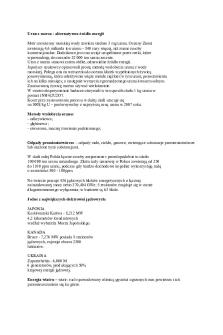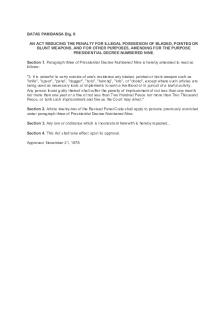Corruption OF Minors (AS Amended BY BP 92) PDF

| Title | Corruption OF Minors (AS Amended BY BP 92) |
|---|---|
| Course | Business Law And Regulations |
| Institution | Technological Institute of the Philippines |
| Pages | 5 |
| File Size | 95.5 KB |
| File Type | |
| Total Downloads | 63 |
| Total Views | 143 |
Summary
Download Corruption OF Minors (AS Amended BY BP 92) PDF
Description
CORRUPTION OF MINORS (AS AMENDED BY BP 92) To promote or facilitate the prostitution or corruption of persons under age to satisfy the lust of another RA 7610 - Child Prostitution and Attempt to Commit Child Prostitution are punished under this Act. ART. 341- WHITE SLAVE TRADE PROHIBITED ACTS: 1) Engaging in the business of prostitution 2) Profiting by prostitution 3) Enlisting the services of women for the purpose of prostitution ART. 342- FORCIBLE ABDUCTION ELEMENTS: 1. That the person abducted is a woman 2. That the abduction is against her will 3. That the abduction is with lewd design FORCIBLE ABDUCTION With lewd design
GRAVE COERCION/ KIDNAPPING No lewd design
Conviction of acts of lasciviousness, not a bar to conviction of forcible abduction Attempted Rape is absorbed by Forcible Abduction as the former constitutes the element of lewd design ART. 343- CONSENTED ABDUCTION ELEMENTS: 1. That the offended party must be a virgin 2. That she must be over 12 and under 18 years of age 3. That the taking away of the offended party must be with her consent, after solicitation or cajolery from the offender 4. That the taking away of the offended party must be with lewd designs
If girl is under 12 – ALWAYS FORCIBLE ABDUCTION CRIMES AGAINST CHASTITY WHERE AGE AND REPUTATION OF THE VICTIM ARE IMMATERIAL: 1) Acts of Lasciviousness against the will of the offended party; or against a sister or descendant 2) Qualified Seduction of sister or descendant 3) Forcible Abduction
ART. 344 – PROSECUTION OF THE CRIMES OF ADULTERY, CONCUBINAGE, SEDUCTION, ABDUCTION, RAPE AND ACTS OF LASCIVIOUSNESS 1) Adultery and concubinage must be prosecuted upon the complaint signed by the offended spouse 2) Seduction, abduction and acts of lasciviousness must be prosecuted upon the complaint signed by a. Offended party b. Her parents c. Grandparents d. Guardians in the order named above. Pardon to adultery and concubinage may be express or implied; whereas express pardon of the offender is required to bar prosecution for seduction, abduction, abduction, or acts of lasciviousness Condonation is not pardon in concubinage or adultery – any subsequent act of the offender showing that there was no repentance will not bar the prosecution of the offense Pardon by the offended party who is a minor must have the concurrence of parents – except when the offended party has no parents Marriage of the offender with the offended party benefits the co-principals, accomplices and accessories EXCEPT in rape because it is already a crime against person; marriage obliterates criminal liability as to the husband only ART. 345 – CIVIL LIABILITY OF PERSONS GUILTY OF CRIMES AGAINST CHASTITY PERSONS WHO ARE GUILTY OF RAPE, SEDUCTION, OR ABDUCTION SHALL ALSO BE SENTENCED:
1) To indemnify the offended woman 2) To acknowledge the offspring, unless the law should prevent him from doing so 3) In every case to support the offspring ART. 347 – SIMULATION OF BIRTHS, SUBSTITUTION OF ONE CHILD FOR ANOTHER, CONCEALMENT OR ABANDONMENT OF A LEGITIMATE CHILD Object of the crime under ART. 347 is the creation of false or the causing of the loss of civil status ART. 348 – USURPATION OF CIVIL STATUS Usurping the civil status of another is committed by assuming the filiation, or the parental or conjugal rights of another with intent to enjoy the rights arising from the civil status of the latter. Crime is qualified if the purpose is to defraud offended parties and heirs
ILLEGAL MARRIAGES (ARTS 349-351) ART. 349 – BIGAMY ELEMENTS: 1. That the offender is legally married 2. That the marriage has not been dissolved or, in case the spouse is absent, the absent spouse could not yet be presumed dead according to the Civil Code 3. That he contracts a second marriage or subsequent marriage 4. That the second or subsequent marriage has all the essential requisites for validity A person convicted of bigamy may still be prosecuted for concubinage. The second spouse who knew of the first marriage is an accomplice, as well as the person who vouched for the capacity of either of the contracting parties. ART. 350 – MARRIAGE CONTRACTED AGAINST PROVISIONS OF LAWS ELEMENTS: 1. That the offender contracted marriage 2. That he knew at the time that --a. The requirements of the law were not complied with; or b. The marriage was in disregard of a legal impediment c. The offender must not be guilty of bigamy
Qualifying Circumstance - if either of the contracting parties obtains the consent of the other by means of violence, intimidation or fraud ART. 351- PREMATURE MARRIAGES PERSONS LIABLE: 1) A widow who married within 301 days from the date of the death of her husband, or before having delivered if she is pregnant at the time of his death 2) A woman whose marriage having been annulled or dissolved, married before delivery or before expiration of the period of 301 days after the date of legal separation Period may be disregarded if the first husband was impotent or sterile ART. 352- PERFORMANCE OF ILLEGAL MARRIAGES Priests, or ministers of any religious denomination or sect, or civil authorities who shall perform or authorize any legal marriage ceremony CRIMES AGAINST HONOR (ARTS 355-364) ART. 353 LIBEL ELEMENTS: 1. That there must be an imputation of a crime, or a vice or defect, real or imaginary, or any act, omission, condition, status or circumstance 2. That the imputation must be made publicly 3. That it must be malicious 4. That the imputation must be directed at a natural person or a juridical person, or one who is dead. 5. That the imputation must tend to cause the dishonor, discredit, or contempt of the person defamed. 2 TYPES OF MALICE: 1) malice in fact – shown by proof of ill-will, hatred, or purpose to injure; also known as EXPRESS MALICE 2) malice in law – presumed from defamatory imputation; proof is not required because it is presumed to exist from the defamatory imputation; When the communication is PRIVILEGED, malice is not presumed from the defamatory words.
ART. 354 REQUIREMENT FOR PUBLICITY MALICE IN LAW – Every defamatory imputation is presumed to be malicious, even if it be true, if no good intention or justifiable motive is shown. The PRESUMPTION is rebutted if it is shown by the accused that – a. The defamatory imputation, is true, in case the law allows proof of the truth of the imputation. (see Art. 361) b. It is published with good intention. c. There is justifiable motive for making it. MALICE is not presumed in the following cases: 1) Private communication made by any person to another in the performance of any legal, moral or social duty. 2) A fair and true report of any judicial, legislative, or other proceedings which are not of confidential nature; 3) Or of any statement, report, or speech delivered in said proceedings, or of any other act performed by public officers in the exercise of their functions...
Similar Free PDFs

THE EFFECTS OF CORRUPTION
- 5 Pages

Minors at iitk updated
- 16 Pages

Grile -92
- 92 Pages

TP4 92%
- 9 Pages

Bp code of conduct english
- 28 Pages

45-92 oswe - 45-92 oswe
- 2 Pages

BP 344
- 58 Pages

BP PROJEK
- 139 Pages
Popular Institutions
- Tinajero National High School - Annex
- Politeknik Caltex Riau
- Yokohama City University
- SGT University
- University of Al-Qadisiyah
- Divine Word College of Vigan
- Techniek College Rotterdam
- Universidade de Santiago
- Universiti Teknologi MARA Cawangan Johor Kampus Pasir Gudang
- Poltekkes Kemenkes Yogyakarta
- Baguio City National High School
- Colegio san marcos
- preparatoria uno
- Centro de Bachillerato Tecnológico Industrial y de Servicios No. 107
- Dalian Maritime University
- Quang Trung Secondary School
- Colegio Tecnológico en Informática
- Corporación Regional de Educación Superior
- Grupo CEDVA
- Dar Al Uloom University
- Centro de Estudios Preuniversitarios de la Universidad Nacional de Ingeniería
- 上智大学
- Aakash International School, Nuna Majara
- San Felipe Neri Catholic School
- Kang Chiao International School - New Taipei City
- Misamis Occidental National High School
- Institución Educativa Escuela Normal Juan Ladrilleros
- Kolehiyo ng Pantukan
- Batanes State College
- Instituto Continental
- Sekolah Menengah Kejuruan Kesehatan Kaltara (Tarakan)
- Colegio de La Inmaculada Concepcion - Cebu







